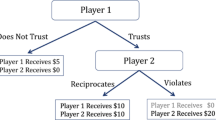Abstract
Self-promises, implicitly-articulated self-agreements, and self-bargains seem to be widespread and important sociopsychological phenomena that have been little studied. As aspects of a problem-solving orientation, possibly inherent in social conduct, they may be significant as a way in which social control operates internally. The purposes, commitments, disclosures and rewards of self-agreements are viewed as mechanisms used to deal with the problematical. Individuals' testimony indicates that awareness of processes involved in articulating self-agreements vary from little to highly active internal negotiating. Findings from an open-ended questionnaire given to 313 respondents are discussed.
Similar content being viewed by others
References
1975 “Specious reward: A behavioural theory of impression and impulse control.” Psychology Bulletin 82:463–496.
1982 “A behavioral economic approach to the defense mechanisms: Freud's energy theory revisited.” Social Science Information 21(6):735–779.
1984 “Behavioral economics II: Motivated, involuntary behavior.” Social Science Information 23(1):47–78.
Antonovsky, Aaron 1974 “Conceptual and methodological problems in the study of resistance resources and stressful life events.” In Barbara Dohrenwend and Bruce Dohrenwend (eds.), Stressful Life Events: Their Nature and Effects. New York: Wiley.
Bandura, Albert 1982 “Self efficacy mechanism in human agency.” American Psychologist 37(2):122–147.
Beck, A. 1976 Cognitive Therapy and Emotional Disorders. New York: International Universities Press.
Becker, Howard S. 1960 “Notes on the concept of commitment.” American Journal of Sociology 66(July)32–40.
Blumer, Herbert 1969 Symbolic Interactionism: Perspective and Method. Englewood Cliffs, NJ: Prentice-Hall.
Cooley, Charles H. 1902 Human Nature and the Social Order. New York: Scribner.
Cvetkovich, George 1978 “Cognitive accommodation, language, and social responsibility.” Social Psychology 41(2):149–155.
Des Pres, T. 1976 The Survivor. New York: Oxford.
Dohrenwend, Barbara andBruce Dohrenwend 1974 “Overview and prospects for research on stressful life events.” In Barbara Dohrenwend and Bruce Dohrenwend (eds.), Stressful Life Events: Their Nature and Effects. New York: Wiley.
Durkheim, Emile 1947 The Division of Labor in Society. Glencoe, IL: Free Press.
Faris, Robert 1952 Social Psychology. New York: Ronald Press.
Goffman, Erving 1959 The Presentation of Self in Everyday Life. Garden City, NY: Doubleday.
Goldstein, Greg and Regina Kenen 1984 “Internal dialogue in a ‘normal’ population: The implications for health promotion.” Unpublished manuscript.
Hewitt, John P. 1984 Self and Society, 3d ed. Boston: Allyn and Bacon.
Ho, David Yau-Fai 1976 “On the concept of face.” American Journal of Sociology 81(4):867–884.
Jeffrey, D. Balfour andRoger C. Katz 1977 Take It Off and Keep It Off: A Behavioural Program for Weight Loss and Healthy Living. Englewood Cliffs, NJ: Prentice-Hall.
Kanfer, F.H. 1970 “Self-regulation: Research, issues and speculations.” In C. Neuringer and J.L. Michael (eds.), Behavior Modification in Clinical Psychology. New York: Appleton-Century-Crofts.
Kemper, Theodore 1978 A Social Interactional Theory of Emotions. New York: Wiley.
Knowles, John 1977 “The responsibility of the individual.” Daedalus 106(Winter):57–80.
Lazarus, Richard 1978 Patterns of Adjustment and Human Effectiveness. New York: McGraw-Hill.
Lazarus, Richard, et al. 1970 “Toward a cognitive theory of emotions.” In Magda B. Arnold (ed.), Feelings and Emotions. New York: Academic.
Lewis, J. David 1979 “A social behaviorist interpretation of the medium ‘I’.” American Journal of Sociology 85(2):261–287.
Mead, George Herbert 1934 Mind, Self and Society. Chicago: University of Chicago Press.
Mechanic, David 1979 Future Issues in Health Care: Social Policy and the Rationing of Medical Services. New York: The Free Press.
Meichenbaum, Donald 1977 Cognitive-Behavior Modification—An Integrative Approach. Waterloo, Ontario, Canada: University of Waterloo.
Schelling, Thomas C. 1963 The Strategy of Conflict:21–52. Cambridge, MA: Harvard University Press.
Scott, Marvin B. andStanford M. Lyman 1968 “Accounts.” American Sociological Review 33(1)46–61.
Strauss, Anselm 1959 Mirrors and Masks: A Search for Identity. Glencoe, IL: The Free Press.
Strauss, Anselm, ed. 1956 The Social Psychology of George Herbert Mead. Chicago: University of Chicago.
Turner, Ralph H. 1976 “The real self: From institution to impulse.” American Journal of Sociology 81(5)989–1016.
Watson, David andRoland Tharp 1970 Self Directed Behavior: Self Modification for Personal Adjustment. Belmont, CA: Wadsworth.
Author information
Authors and Affiliations
Rights and permissions
About this article
Cite this article
Kenen, R.H. Making agreements with oneself: Prelude to social behavior. Sociol Forum 1, 362–377 (1986). https://doi.org/10.1007/BF01115743
Issue Date:
DOI: https://doi.org/10.1007/BF01115743



